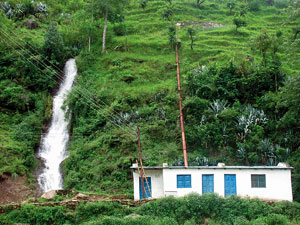 |
The changes brought about by microhydro plants and small Peltric sets have made a huge difference to local livelihoods in the remote areas of Nepal. The kerosene lamps has become a thing of the past. Many households now have computers instead and telecom companies have been able expand their services to the villages by installing their towers in the remote corners of the districts.
Life in villages of Solukhumbhu district will never be the same. Not long ago, locals in Solukhumbu were forced to pay Rs 200 per litre of kerosene just to light their house. But today villages here run cyber cafes, FM stations and highvision cinema halls. Small-scale industries have been set up. And while the nation prepares to face annual power famine this winter, villagers in Solukhumbu enjoy uninterrupted power supply.
After the extension of 33 KV line from Devighat in the year 2000, most villages in Dhading district are electrified. Economic activity has brought prosperity and jobs. Every village in Kabhre district has access to electricity today. There are 53 industries and 20 business centres using electricity from the national grid. Micro-hydro supplies power to those places where there is no national grid. There are 57 micro-hydro plants and around 3,000 households in the district use solar system.
Chilime, the first nationally funded commercial hydropower project that came into operation in 2003, led to a spurt in investments in Rasuwa district. Several medium and small scale projects including 57 MW Syangjen Hydro Project and 60 MW Trishuli A are underway. Besides, locals have made investment in 7 MW Dhunche Diksha and 15 MW Phalukhola hydro power projects.
Sindhupalchok district saw its first power project in 1970s when China built the Sunkosi project. According to Naresh Pandey, the district chief of NEA, 72 of 75 VDCs in Sindhupalchok now have electricity. Some 2,773 households benefit from micro hydro and 200 household have solar set at their homes, although tourist destination like Helambu and other remote areas are yet to get access to electricity.


